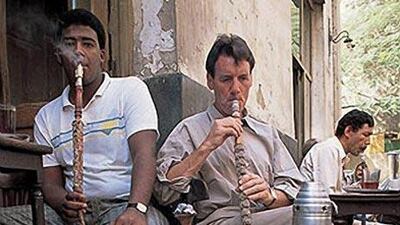Back in the late 1970s, as the six members of the Monty Python team - Graham Chapman, Terry Gilliam, Eric Idle, Terry Jones, Michael Palin and John Cleese - continued their assault on Hollywood with The Life of Brian, few would have assumed that 30 years later, Palin would reign as the most visible member of the comedy troupe. Cleese, on occasion, pops up in franchises such as Shrek; the films of Terry Gilliam, meanwhile, plot a downwards trajectory of squandered opportunities and low-rent CGI. Palin, however, has emerged as an unlikely British ambassador - a man of books, radio and travel journalism.
A self-confessed dromomaniac, his Travels With Palin is a collection of the wildly successful TV series that have charted his adventures over the past three decades. Whether indulging his love of railway journeys from Euston in London to the Scottish Highlands, retracing the footsteps of Jules Verne's fictional hero Phileas Fogg by leaving London's Reform Club and circumnavigating the globe to return in 80 days, or taking in the restless travels of one of his favourite writers, Ernest Hemingway, Palin's innate curiosity makes for compelling viewing.
Travel journalism is often an exercise in detailing how the writer/presenter journeys from A to C via B. Any sense of self-discovery or drama is jettisoned in the need to list journeys (often according to their timetables) by planes or trains. Palin, on the other hand, is a dinner party host turned traveller: we rarely see the drudgery of modern airports and their long security queues, delayed flights and missed connections. Travelling with a large TV crew doesn't naturally facilitate location shooting, but Palin saves his enthusiasm for once he reaches his destination.
Together, the series collected in Travels With Palin provide a fascinating insight into the narrator's easy charms. The Pythons might have excelled at a particular brand of class humour - the team was sometimes criticised for its elitist and periodically cruel streak - but Palin is a host who allows his subjects all the time they need to breathe and relate their stories. Witness the scene as he watches a series of pitiful Hemingway impersonators - exaggerated beards and equally overweight torsos on display - take to the stage in a bar to evoke the macho charms of the pugilist-turned-writer. A host such as Jeremy Clarkson or Jonathan Ross would invariably become central to the proceedings. Palin, though, holds back, watching the procession of impersonators with a wry smile. He is encouraging when needed, and quick to commiserate with the losers.
The travels through the Sahara, the Himalayas and New Europe (loosely described as the Balkans of the post-Communist empire) are three reasons alone to invest in this box set. But it is the 1999 series on Hemingway, titled Hemingway Adventure, that betrays a particular hold on the narrator. Watching Palin, who was born in Sheffield, follow the footsteps of the celebrated author and raconteur, is to know what makes him tick - the need to escape, forge a public persona and live life to the extreme. Palin methodically follows Hemingway's ghost to the bullfights of Valencia; the suburbs of Chicago, where the writer was born; the fishing village of Key West, where he would hold court; and, eventually, to the bustling nightlife of Fidel Castro's Havana, where the author would look for inspiration and entertain Hollywood friends such as Gary Cooper and Grace Kelly.
In death and in keeping with our modern need to memorialise each passing as a moment of some significance, Hemingway's life is now celebrated with some rather bizarre festivals across the globe. Outside Havana, Hemingway's home more resembles a Cuban Graceland than a place where the author might have written some of his greatest works. Palin seeks to brush aside the sepia-tinted anecdotes of yesteryear and instead looks back to the writer's novels and short stories to explain his motivations. In the process, Palin discovers the reasons behind his own restless need to travel. The episode reveals much about his wanderlust - as well as why, 30 years after he first set off on the road, his travels have become such an institution.

